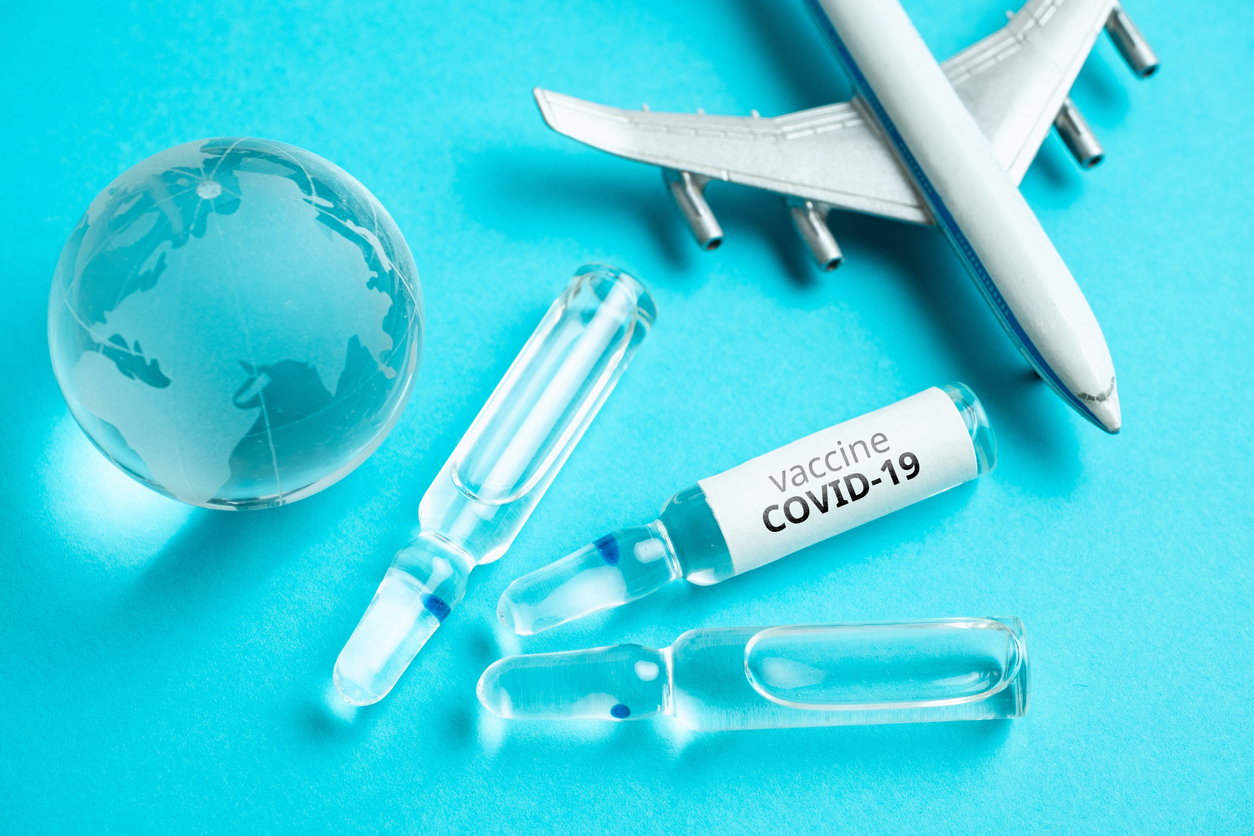The roll-out of COVID-19 vaccines has inspired optimism around restarting travel. According to On Call’s Chief Medical Officer, Dr. Siegart, “Receiving the COVID-19 vaccination is a vital step toward beating this pandemic and will ultimately play a pivotal role in creating more confidence around travel in the months to come.” Dr. Siegart says he’s seen an abundance of inquiries about COVID-19 vaccines and travel, so he’s answering some of the most frequently asked questions and sharing some advice for would-be travelers. Read on for Part 2 of this two-part COVID-19 Vaccines & Travel Q+A series.
Haven’t read Part 1 yet? Read it here.

Are there certain populations that shouldn’t get the vaccine before traveling?
Dr. Siegart: The vaccine is only absolutely contraindicated for those who have adverse or allergic reactions to the components of the vaccines themselves.
How long does vaccine protection last?
Dr. Siegart: No one knows for certain at this point. Currently, it is believed that there will be protection for at least a year and possibly two. However, given the normal mutations that occur for any virus over time, it is anticipated that booster shots targeted to the new variances will be necessary on a yearly basis.
Can a traveler get a COVID-19 vaccine at the same time as another vaccine?
Dr. Siegart: No. It is recommended there be at least two weeks in between receipt of a COVID-19 vaccine and any other vaccine.
Can the COVID-19 vaccine decrease the effectiveness of other vaccines (and vice versa)?
Dr. Siegart: No, it does not.
Does getting vaccinated ‘exempt’ someone from the new CDC order requiring travelers to present a COVID-19 test before flying to the US from abroad?
Dr. Siegart: No. Effective January 26, 2021, all air passengers traveling to the United States, regardless of COVID-19 vaccination or antibody status, must present documentation of a negative COVID-19 test result or documentation of recovery from COVID-19 to the airline.
If someone has already contracted and recovered from COVID-19, will they still need to present a negative COVID-19 test before flying to the US from abroad?
Dr. Siegart: Yes, they do. Per CDC guidelines, if an individual has contracted COVID-19 and then subsequently recovered from the virus, they will need to present documentation of the positive COVID-19 test associated with the acute illness as well as a letter from their treating physician attesting to their complete recovery.
For US residents traveling abroad – will they need the vaccine to re-enter the US?
Dr. Siegart: Currently there is no requirement for US residents to obtain the COVID-19 vaccine before re-entering United States. However, as mentioned previously, they will have to present documentation of a negative COVID-19 test.
Should travelers still be as concerned about surfaces as they were at the beginning of the pandemic? Or is it ‘more about the masks’ now?
Dr. Siegart: How we prevent the virus is still the same—it is about everything and all of it matters. We all should continue to practice good hygiene such as washing hands often with soap and water, cleaning and disinfecting frequently touched objects and surfaces, wearing masks and social distancing, and avoid touching the eyes, nose, and mouth with unwashed hands.
Do you have any additional advice for would-be travelers?
Dr. Siegart: Pre-planning is essential. Everyone should know their own personal health risks prior to travel. This can include any pre-existing conditions, potential COVID-19 exposure, and medical treatment resources at their intended destination. Moreover, the various COVID-19 travel, quarantine, travel restrictions, and COVID-19 testing requirements and availability must be identified and planned for prior to departure. There are several resources available in this realm, including the CDC travel planner for travel within the United States and abroad, as well as On Call’s COVID-19 Travel Outlook Map for updated information on individual countries’ travel advisories, COVID-19 case trends, travel restrictions, and healthcare capabilities.
Want to learn more? On Call’s clients are encouraged to consult with us for the most up-to-date information on their destinations and recommendations around risk prevention and travel health planning. For everyone else, please feel free to get in touch with us for more information, as well as how On Call can help protect your travelers with our customized travel risk management and assistance programs. Also, don’t forget to check out Part 1 of this two-part blog series, as well as Dr. Siegart’s COVID-19 Travel & Testing Q+A.
For over 25 years, On Call International has provided fully-customized travel risk management and global assistance services protecting millions of travelers, their families, and their organizations. Contact us today and watch our video to learn more. You can also stay in touch with On Call’s in-house risk management, travel health and security experts by signing up for our quarterly Travel Risk Management (TRM) newsletter.
The information provided within this post has been compiled from a multitude of available sources, and is based on the current news and situational analysis at the time of writing.


